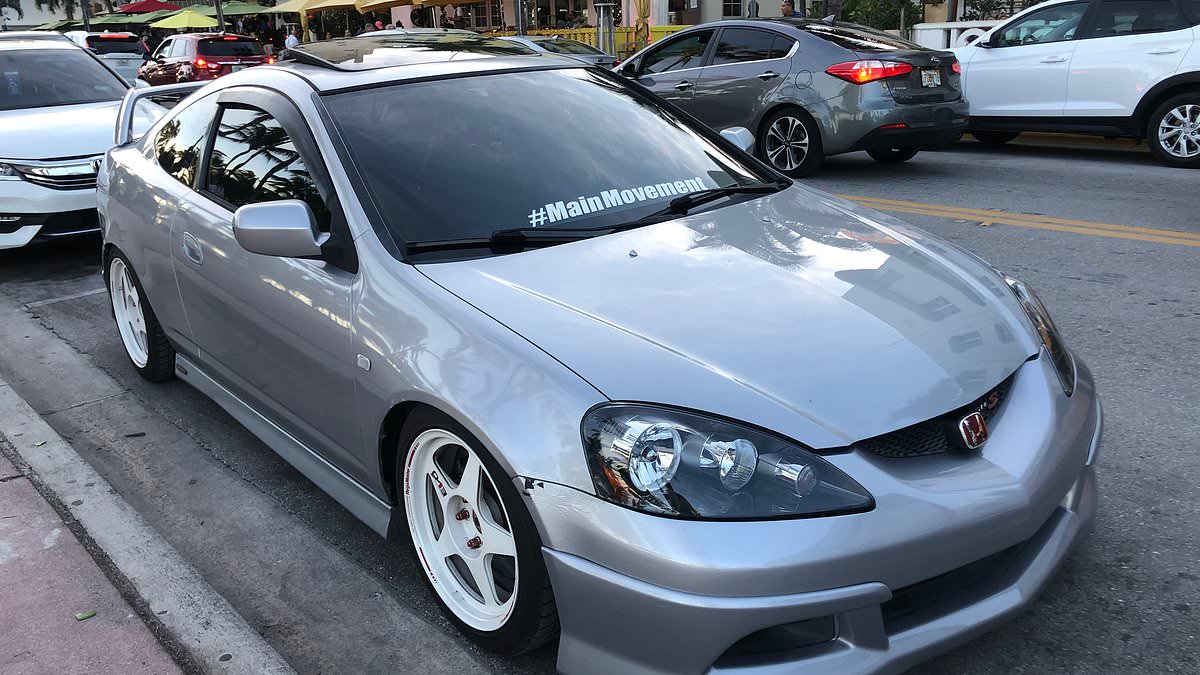A Florida man won a $3 million lawsuit after his Honda’s airbag inflator exploded in a crash – launching shards of metal that sliced through his arm.
Jose Hernandez was severely hurt in a December 2020 vehicle collision that should have only caused minor injuries, his attorneys have claimed.
Hernandez was making a left turn down a Miami road in his 2005 Honda Civic when another vehicle rammed into his.
The impact triggered the Honda’s Takata airbag inflator, but it malfunctioned and blew up, sending shrapnel inches deep into Hernandez’s right arm.
Hernandez decided to demand justice for himself and sued the Takata Airbag Tort Compensation Trust Fund, which was formed after Takata went bankrupt in the midst of the airbag scandal, in 2022.
He also named the Braman Honda of Miami in the suit, accusing the dealership of selling him the car without telling him it had been recalled.
Miami-Dade jurors ruled in Hernandez’s favor in court on Thursday, the Associated Press reported.
‘Our Firm represents more than a hundred victims of Takata airbags, and we have seen the damage and chaos these deadly devices cause,’ Morgan & Morgan founder John Morgan and Hernandez’s attorney Andrew Parker Felix wrote in a statement.
‘This case demonstrated exactly how the Trust Fund was set up to function – protecting the rights of individuals to seek justice in court when the Fund fails to provide adequate compensation.’
The law firm told DailyMail.com Honda is ‘responsible for the Trust’s legal fees and costs and the entire verdict awarded to the plaintiff.’
Hernandez had opted out of the Takata Airbag Tort Compensation Trust Fund and instead sued for the compensation he believed he deserved, Morgan & Morgan explained.
DailyMail.com has reached out to the fund for comment on the verdict.
Takata airbags have an extensive history of fatal mishaps, with at least 28 deaths and more than 400 injuries in the US being linked to them since 2009.
Stephanie Erdman, a First Lieutenant in the US Air Force, of Florida, was among those whose lives were changed for the worse by the defective devices.
Her eye and neck were pierced by sharp pieces of metal from the Takata airbag inflator in her 2002 Honda Civic when she crashed the car in 2013.
‘When the impact occurred, shrapnel from my car’s airbag inflator shot through the airbag cloth and embedded in my right eye and neck,’ Erdman said at a 2014 US Senate Committee on Commerce, Science and Transportation Hearing.
‘I was instantly blind on my right side. And then I felt gushing blood. It was terrifying. I thought I was going to bleed out.
‘I should have gotten a few bumps and bruises like the passenger in my car. I should not have been injured in the shocking and terrifying way that I was.’
Across the globe, 36 people have died in connection to the faulty safety devices, sparking wide-scale recalls affecting 19 car companies that began in 2013.
More than 67 million airbags have been called back across the US and more than 100 million have been recalled globally, according to the National Highway Traffic Safety Administration (NHTSA).
The Japanese manufacturer used ammonium nitrate to make a tiny explosion to inflate the airbag.
But heat and humidity alter the chemical, resulting in the overly forceful explosions that cost people their lives.
In 2017, the Takata Corporation pleaded guilty to wire fraud and agreed to pay $1 billion in penalties for selling the defective devices.
In addition to the hefty sum of cash, Takata established two restitution funds – one worth $125 million for people injured by the airbags and a $850 million fund for auto companies who suffered financial losses because of the recalls.
‘Automotive suppliers who sell products that are supposed to protect consumers from injury or death must put safety ahead of profits,’ US Attorney Barbara McQuade of the Eastern District of Michigan said in a press release at the time.
‘If they choose instead to engage in fraud, we will hold accountable the individuals and business entities who are responsible.’
Takata had been falsifying product-safety data for more than a decade, Fraud Section Chief Andrew Weissman claimed.
The Department of Justice (DOJ) said Takata executives admitted they knew that from at least 2000, the company’s inflators were not meeting standards set by automakers.
They were also reportedly aware of the chance of deadly explosions, as ruptures occurred during testing.
Takata opted to ignore the red flags, allegedly submitting fraudulent reports that the inflators were good to go.
Three executives who left the company in 2015 were each indicted and charged in connection to the scheme.
Shinichi Tanaka, Hideo Nakajima, and Tsuneo Chikaraishi were charged with one count of conspiracy to commit wire fraud and five counts of wire fraud.
While losing business and being slammed with both class action and individual lawsuits, Takata filed for bankruptcy in 2017.
The following year, CEO Shigehisa Takada officially resigned and Takata was taken over by American company Key Safety Systems, now known as Joyson Safety Systems.
More than a decade since the airbags were recalled, roughly six million cars in America still have the hazardous devices.
‘Even after a decade of a dedicated and committed effort by the vehicle manufacturers, government, nonprofits and businesses, it’s concerning that so many affected vehicles continue to be driven on US roads with these potentially dangerous airbags sitting inside,’ Faisal Hasan, Carfax general manager for data said last May.
‘It’s easy to see recall fatigue settle in for many consumers, but they need to act.
‘Getting an airbag replaced is quick, free to them, and could save the life of a loved one – or their own.’
